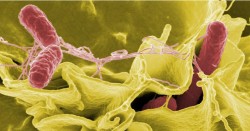Press Release, 11. October 2021
Consortium on microbiological research started
The UFZ participates in the National Research Data Infrastructure NFDI4Microbiota
The National Research Data Infrastructure for Microbiological Research (NFDI4Microbiota) aims to achieve better access to data, new tools for analysing data, standards for data and metadata, and a comprehensive training programme for scientists. It started work on the 1st of October. The main task of the Helmholtz Centre for Environmental Research (UFZ) is to make big data more accessible to microbiologists.
The UFZ is part of the consortium that will set up and provide NFDI4Microbiota over the next five years. The NFDI4Microbiota consortium has set itself the goal of supporting the microbiology research community in Germany. For example, we will make data, information and knowledge about microbiota available in a fair and transparent manner by systematically collecting data, standardising data processing and analysis, developing new computational tools and infrastructure for translating data into new knowledge or providing central information hubs tailored to the needs of the research community. The consortium is funded by the German Research Foundation (DFG) for an initial period of five years with about three million euros annually.
As one of the ten partner institutions, the UFZ will receive a total of around one million euros for the next five years. "Our work will relate to creating databases, reviewing data systems and integration of omics data and others", says Dr Ulisses da Rocha, who heads the Microbial Data Science junior research group at the UFZ. The main goal of the UFZ participation in the consortium is to make data in microbiome studies available to those without expertise in bioinformatics or computer sciences. Further, as 'omics’ data (e.g., genomics, transcriptomics, proteomics) grows exponentially due to lower costs, more data is available. Scientists cannot analyse this data without specialised bioinformatics and computer science tools. "Our team at the UFZ will contribute to making user-friendly tools to work with this data. We will also create material for self-learning and give classes to those without any expertise in the area to give their first steps in the fields", he adds.
Additional UFZ activities in NFDI also encompass the NFDI4Biodiversity consortium dedicated to mobilising biodiversity and environmental data for collective use where UFZ is a co-applicant. In addition, UFZ participates in the following two NFDI initiatives: While NFDI4Chem strives to build an open and FAIR infrastructure for research data management in chemistry, NFDI4Earth addresses digital needs of reseracher in Earth System Sciences.
NFDI4Microbiota consists of a total of ten partner institutions and more than 50 participating institutions. The consortium is represented by Prof. Alice McHardy (Helmholtz Centre for Infection Research) and Prof. Konrad Förstner (ZB MED - Information Centre Life Sciences in Cologne). NFDI4Microbiota is part of the DFG-funded National Research Data Infrastructure (NFDI), under construction since 2018.
Further Information: https://nfdi4microbiota.de
Further information
Dr. Ulisses da Rocha
UFZ Department Environmental Microbiology
ulisses.rocha@ufz.de
UFZ press office
Susanne Hufe
Phone: +49 341 6025-1630
presse@ufz.de
In the Helmholtz Centre for Environmental Research (UFZ), scientists conduct research into the causes and consequences of far-reaching environmental changes. Their areas of study cover water resources, ecosystems of the future, environmental technologies and biotechnologies, the effects of chemicals in the environment, modelling and social-scientific issues. The UFZ employs more than 1,100 staff at its sites in Leipzig, Halle and Magdeburg. It is funded by the Federal Government, Saxony and Saxony-Anhalt.
www.ufz.deThe Helmholtz Association contributes to solving major challenges facing society, science and the economy with top scientific achievements in six research fields: Energy; Earth and Environment; Health; Key Technologies; Matter; and Aeronautics, Space and Transport. With some 39,000 employees in 19 research centres, the Helmholtz Association is Germany’s largest scientific organisation.
www.helmholtz.de
